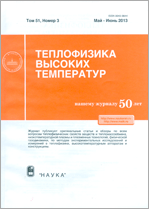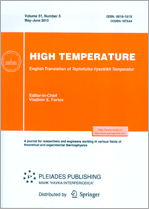|
This article is cited in 7 scientific papers (total in 7 papers)
Heat and Mass Transfer and Physical Gasdynamics
Heat transfer in supercritical fluids: Reconciling the results of pulse and stationary experiments
S. B. Ryutin, P. V. Skripov
Institute of Thermal Physics, Ural Branch, Russian Academy of Sciences, Ekaterinburg
Abstract:
The article is devoted to the generalization of the results of pulse experiments performed under conditions of powerful heat release in supercritical-pressure liquids. The characteristic heating time was changed from $10^{-3}$ to $10^{-2}$ s, while the heat flux density through the probe surface was increased up to $10$ MW/m$^2$. The parameters of the discussion are the values of the speed of crossing the vicinity of the critical temperature and pressure reduced to the critical one. These results obtained for “heater–probe/supercritical fluid” system and based solely on comparison of the primary data indicate a threshold decrease in the intensity of heat transfer near the critical temperature. The purpose of this summary is to suggest a relatively simple approach to reconciling the pulse heating results with the peaks of thermophysical properties derived from experiments in stationary conditions. It is assumed that the action of gradient in temperature and the presence of heat-transfer surface can serve as factors that suppress large-scale fluctuations in pulse heated system, leading to a “smoothing” the critical enhancement of the properties.
Received: 19.03.2020
Revised: 02.06.2020
Accepted: 18.06.2020
Citation:
S. B. Ryutin, P. V. Skripov, “Heat transfer in supercritical fluids: Reconciling the results of pulse and stationary experiments”, TVT, 59:2 (2021), 203–211; High Temperature, 59:2 (2021), 178–185
Linking options:
https://www.mathnet.ru/eng/tvt11374 https://www.mathnet.ru/eng/tvt/v59/i2/p203
|


| Statistics & downloads: |
| Abstract page: | 135 | | Full-text PDF : | 82 |
|





 Contact us:
Contact us: Terms of Use
Terms of Use
 Registration to the website
Registration to the website Logotypes
Logotypes








 Citation in format
Citation in format 
